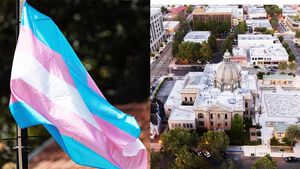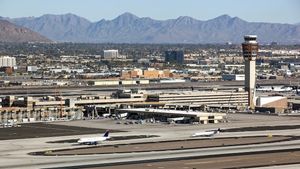Photography by Platon
Many of us think we know Robert De Niro. We know him as Travis Bickle or Vito Corleone or any number of other gangsters or bad guys. His ability to combine corrupted virtue with deep sorrow and wit -- along with a fearsome sensuality -- has made him a film hero with a tough exterior. Perhaps that's why it's so shocking to see him shake and sob as he talks about his late father, who lived openly as a gay man.
It's been more than 20 years since Robert De Niro Sr.'s death from cancer, but his memory is fresh for his son, who has preserved his father's final home and studio in New York City's SoHo. Filled with books, paintbrushes, and hundreds of canvases, some of which he never finished, it looks like pop stepped away for a coffee and should be back to finish another still life before dinner. The loft remains a quiet shrine to an artist that few recognize, perhaps mistaking his figurative paintings for a late Matisse or another French master. "It was the only way to keep his being, his existence alive," De Niro explains. "To me, he was always a great artist."
Now 70, the actor has decided to reveal this hidden sanctum and his own struggle with his late father's memory in a new documentary that premieres June 9 on HBO. In Remembering the Artist: Robert De Niro, Sr., directed by Perri Peltz, the son tears up as he reads from his father's diaries. He shares intimate stories of his father's despair about his sexual orientation and his stagnant artistic reputation. At one point, as De Niro was ascending to Hollywood's top tier, he made a last-ditch effort to rescue his father, who was sick in Paris, where he'd been living as a starving artist. It's clear that De Niro regrets that he wasn't able to help him more before he died, and the film becomes a moving portrait of a son who wants to resurrect his father's legacy before it's too late. Out was given a rare glimpse into the legendary actor's personal life, spending a day in his father's studio. De Niro revealed a fragile, tender side as he explained why he hopes his dad's work will live on.
After seeing the studio in the documentary, I wondered what this space meant to you. Do many people visit?
I've brought people here over the years. I've had a reception or two here. When I thought I was going to have to let it go, three or four years ago, I videotaped it and had photos taken and documented everything. But then I said, "I just can't do it."
It's a different experience when you're here than when you see it in photos. I did it for the grandkids and my young kids, who didn't know their grandfather.
It amazes me that SoHo has these hidden spaces that, no matter what, never seem to change.
Exactly. And I like things that don't change. I like consistency. Constancy. People look forward to tradition, they come back, it's still there, nothing's changed. Like when you go to a certain restaurant and you go back, and all of sudden it's changed because they hired a new chef. If it's not broke, don't fix it. This space is here, and in 20 years, people won't know what a real space like this will be unless it was in a museum and they recreated it.
After your father's death, did you lock the door and not come back? Or did you take a while before you decided what to do with it?
I didn't think of just selling it and dismantling it. Luckily, I could afford to keep it going, so I left it as is. My mother was alive then. I don't remember what we discussed. I documented and went through everything to make sure we catalogued it, and then I said, "I'm keeping it like this."
His older studios, like, a block away, maybe 60 years ago, were not like this. Then it was Siberia -- for real -- on West Broadway or LaGuardia Place. My mother had this place first and then she gave it to my father; they were friends. She came down here a long time ago. She had a place in the Meatpacking District, like, 50 years ago.
When did you begin to read his diaries?
I haven't even read all the diaries -- I started. I read the ones for the film, but I haven't read all the other material. I will, of course.
One of the things that was very moving for me in the film was the fact that you're named after your father. How do you feel about that -- sharing a name -- and when you become more famous than the person you're named after?
[De Niro begins to cry, takes off his glasses, and pauses to collect himself.]
I get emotional. I don't know why.
When you were younger, it sounded like you had problems connecting with each other.
We were not the type of father and son who played baseball together, as you can surmise. But we had a connection. I wasn't with him a lot, because my mother and he were separated and divorced. As I say in the documentary, I looked after him in certain ways.
In what ways?
I think of my own kids. I try to communicate with them, but it's hard. I joke about it with them. They have their issues as teenagers. I give them their space, but when I have to step in and be firm about something, I am. But my father wasn't a bad father, or absent. He was absent in some ways. He was very loving. He adored me... as I do my kids.

 Pictured: Robert De Niro in repose on a divan in his father's SoHo studio. | Photography by Platon
Pictured: Robert De Niro in repose on a divan in his father's SoHo studio. | Photography by Platon
I think people may be curious because, in a way, you are coming out for your father. He may not have been hiding his lifestyle or who he was, but it's not something that is common knowledge.
I felt I had to. I felt obligated. It was my responsibility to make a documentary about him. I was always planning on doing it, but never did. Then Jane Rosenthal, my partner at Tribeca [Enterprises], said, "We should start doing that now." It was not intended to be on HBO. It was just something I wanted to do.
I had footage from a guy who used to follow my father around in the '70s. We started with that. I bought it from him and gave the footage to Thelma Schoonmaker, who was Marty Scorsese's editor. I asked her what she could do with it, and she assembled it and put it together -- it was falling apart. Then we started the documentary [with director Perri Peltz], really working, using pieces that would make sense. My original idea was to do it for the kids, about my father -- whatever it would be. I didn't know how long it would be. The thing with HBO is, I felt they would be objective about certain things. I said, "Let's see what we come up with."
Is there a piece of your father's that's your favorite?
Oh, I have a lot. I have Venice by Night at my house. I love the ones at Locanda Verde, at the grill upstairs on the second floor. There are a lot of black-and-whites that are terrific. I like the delicacy of them, the refinement. They have a certain kind of clarity. They're really great.
What did it mean to have two parents who were artists? You started acting, and all these creative paths mean a lot of rejection, being told "No."
When I was young, I wasn't afraid of being told "No." I tell my kids, I tell everyone, "If you don't go, you never know." I didn't take it as rejection. Certain things are stacked against you. You're coming out of nowhere, starting out -- that's part of the excitement of it in a way, too.
If I may return to some of the things you read from the diaries in the documentary, your father said he felt like being an artist was an "affliction," and he thought being gay was a sort of affliction. Do you think he was conflicted about his life's passion?
About his homosexuality? Yeah, he probably was, being from that generation, especially from a small town upstate. I was not aware, much, of it. I wish we had spoken about it much more. My mother didn't want to talk about things in general, and you're not interested when you're a certain age. Again, for my kids, I want them to stop and take a moment and realize that you sometimes have to do things now instead of later, because later may be 20 years from now -- and that's too late.
It seems that you are trying to recuperate your father's legacy, to maybe make his name last longer than yours.
Well, you never know. His art could last longer than my films. Although the digital stuff, it'll always be there. Great art should last forever.
Some of your contemporaries, like Al Pacino, have made films with queer themes. I wonder if your father's sexual orientation may have influenced your choices. Were there projects you didn't want to do because of your dad?
No, I didn't... those were just the things I did or wanted to do. I won't speak for Al. He did it because it was a good part at the time. It didn't happen for me.
It wasn't because you were shying away from certain roles?
No, they weren't offered to me. If they had been offered to me by a good director, that's something I would have considered.
Your daughter Drena is in the film, and she actually sat for your father.
Yes, he did some nice pieces of her. Raphael, my son, was too impatient to sit still. I was, too. But he had some nice things of her. That was between them. He would ask her to do it. I wish I would have pushed to have him do portraits of all of us.

In the movie, you reveal the fact that your father often felt superior. That sort of ego is something a creative person sometimes needs to survive. Do you think it's rubbed off on you?
In some ways, but I like to be around people. He spent a lot of time alone, or with a still life or a model. That was his thing. What I remember him saying was, "People, what they appreciate in art, that's their taste. It's as valid as anything else." On the other hand, he had very high standards. When a certain artist came along -- an obvious one was Warhol -- to his standards, he totally didn't get that. This is a whole other thing. There are people who don't know a bunch about art, but they buy it as an asset that will gain value, like a diamond. They don't necessarily know what good art is. They don't care.
Since you're sharing his work in this way, do you also have plans to share his diaries?
I'm not sure. I'm going to go over them and talk to everybody about what they think. I have no problem with that. That's part of his legacy, too -- what he was, what he felt.
Even though you said this information is already out there, it's a brave thing to share it. Was there anybody who said, "Don't do it"?
No, no. I think it's time. I thought about it, of course, but if you're going to do something, you have to do it all the way. You can't hide anything. That's the whole point -- the truth. That's what people are attracted to. I should have done this 10 years earlier, but I'm glad I did it now.
Remembering the Artist: Robert De Niro, Sr. premieres June 9 on HBO. Watch the trailer below:




























































































